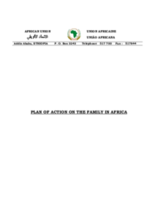1. EXECUTIVE SUMMARY
1. The Constitutive Act of the African Union (AU) articulates the determination of Member States to promote peoples’ rights, consolidate democratic institutions and culture, and to ensure good governance and the rule of law. In addition, it resolves to take up the multifaceted challenges that confront the continent and peoples in light of the social, economic and political changes taking place in the world. Recognition that the family is the basic and most fundamental unit of society, a dynamic unit engaged in an intertwined process of individual and group development, justifies the need to place the African family at the core of society which needs to be strengthened as part of Africa’s development process.
2. As the core of the society, the Family can be seen in three dimensions: firstly, as a psycho-biological unit where members are linked together by blood ties – kinship relationship, personal feelings and emotional bonds of its members; secondly, as a social unit where members live together in the same household and share tasks and social functions; and thirdly as the basic economic production unit. It is, therefore, imperative to provide sustained support and encourage cohesion of the family to enable it play its role. In this regard, it is necessary to develop and implement social policies to address the various concerns of families.
3. In Africa, the family is an equally important institution of society but it is undergoing tremendous changes and facing many formidable challenges thus increasing pressures on the family, including: increasing poverty, civil strives and conflicts; and vulnerability. Other constraints faced by the African family include: the debt burden, poor governance, high unemployment rate, inadequate social security mechanisms, rural to urban migration, gender inequality, displacement and disintegration of family. The intensifying impact of HIV/AIDS and other pandemics on the socio-economically productive sector of the population, especially young women, is putting unprecedented strain on the family. To effectively address these challenges, there is a need for an integrated approach that places the family at the centre of a comprehensive development agenda, aimed at sustaining the its integrity.
4. Cognizant of the multidimensional challenges facing the family the world over, the United Nations and other regional and national agencies have tried to pay particular attention to family problems. A landmark in the UN’s effort to address family concerns was the declaration of 1994 as the International Year of the Family (IYF). Pursuant to this was Resolution CM/Res 1466 (LVIII) of the then OAU, urging Member States to give priority to the preparation for and observance of the IYF and establish National Coordinating Committees or similar mechanisms for the Year. Although African governments have put in place institutions and programmes directed to the family, a lot still remains to be done.
5. It is in this context that, in Decision EX/CL/65 (III), the Heads of State and Government, meeting at Maputo in July 2003, mandated “the AU Commission, in collaboration with UNICEF and other social partners to elaborate a Plan of Action on the Family in Africa, which will constitute Africa’s contribution to the Tenth Anniversary of the IYF”.
6. The main objective of the Plan of Action is to advocate for the promotion, formulation, implementation and monitoring of policies and programmes to ensure the protection of and support to the African family so as to enable it play its vial role more effectively in the development of Africa. The creation of appropriate structures, mechanisms and capacities for responding to the challenges facing the family are an integral part of the Plan of Action.
7. A management information system (MIS) is proposed for continuous data collection, analysis, utilisation, dissemination, storage and retrieval of information on the status of the family at all levels. The New Partnership for Africa’s Development (NEPAD) reaffirms that Africa’s development begins with the quality of its human resources and in this context, the African family is the most important human resource.
8. The Plan of Action focuses on nine priority areas: poverty alleviation; rights to social services - education, health and reproductive health; promoting environmental sustainability - environment, water and sanitation, adequate shelter and land ownership; rights, duties and responsibilities; rights of protection for the family; strengthening family relationships; control of major causes of morbidity and mortality; ensuring peace and security; and follow-up, evaluation and monitoring.
9. Each priority area has an objective with corresponding activities to attain the goal. The Plan of Action will serve as a framework to guide Member States in developing or evaluating appropriate national strategies and programmes on the African family and does not replace or underplay the role of other ongoing initiatives such as the Millennium Development Goals (MDGs), Poverty Reduction Strategy Papers (PRSPs) and NEPAD. Rather, the Plan of action on the African Family reinforces the focus on the family and aims to create linkages between the activities proposed and existing initiatives as well as build upon gains already made.
10. Partnerships among all concerned stakeholders are mandatory for the effective implementation, follow-up and monitoring of the Plan of Action on the Family in Africa.

